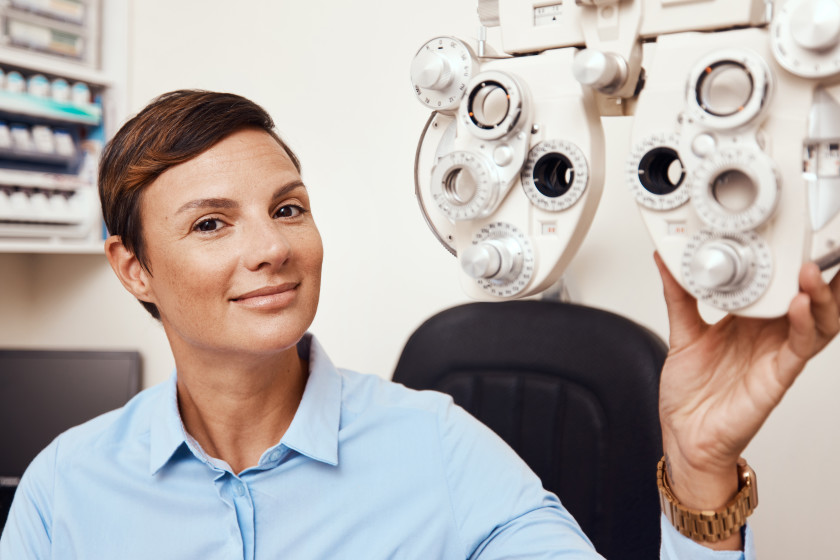Buy One, Get One 50% OFF Eyeglasses
* Restrictions apply. Ask a Team Member for details.

Why Do Eye Doctors Dilate Your Eyes?
Whether you've had a dilated eye exam in the past or this is your first time, you might have some questions about your upcoming eye exam. Why do eye doctors dilate your eyes? What vision problems are they looking for? Do you need to have your eyes dilated every year?
Continue reading to learn more from your local Clarkson Eyecare. We want you to go into your eye exam feeling confident and comfortable.
So, Why Are My Eyes Dilated?
According to the American Academy of Ophthalmology, a dilated eye exam is beneficial because it lets your eye doctor get a better view of the area behind your pupil. The pupil is the round, black center of your eye. By dilating, or widening, the pupil, eye doctors can see all of the anatomy of the back of the eye more clearly.
Carefully inspecting these parts of your eye can help eye doctors identify potentially harmful eye diseases, such as:
Diabetic retinopathy
Age-related macular degeneration
Glaucoma
Retina detachments
The early stages of many eye conditions don't always have symptoms, so it's important for your doctor to assess the inside of your eye for early detection and treatment. Systemic conditions, such as diabetes, can also be detected during a dilated eye exam.
How Your Eyes are Dilated
Your eye doctor will dilate your eyes using dilating eye drops. Anesthetic is used initially to make sure your dilation is a quick and painless procedure.
It takes about 15 to 30 minutes for your pupils to fully dilate. Those with lighter-colored eyes often dilate faster than those with brown eyes.
What Happens When Your Eyes Are Dilated?
The pupil will shrink in size if exposed to light. This can make examining your eye un-dilated more difficult for your eye doctor. Once your eyes are fully dilated, your doctor will begin the examination.
An eye doctor uses a high-powered light and magnifying tool to view the inside of the eye. They then inspect your overall eye health, looking for any signs of any potentially harmful eye conditions.
How Long Does Pupil Dilation Last?
Dilating your pupils may cause temporary light sensitivity or blurry vision. These vision problems usually wear off 1-2 hours after being dilated.
This time varies depending on what eye drop was administered, so be sure to ask your eye doctor for more information.
Be Prepared for Your Dilation
Be sure to bring sunglasses with you in case of light sensitivity after your eye exam. Your doctor may also have disposable sunglasses available for your use.
If you wear contacts, bring your glasses along as well. The eye doctor may not want you to put your contacts back in after the dilation, as they could damage your lenses.
Driving after getting your pupils may be dangerous, so maybe plan for a friend to drive you home from the eye exam if possible.
Factors That May Determine the Frequency of Dilated Eye Exams
The National Eye Institute states that how often you need a dilated eye exam can depend on a few factors, such as your age and personal risk profile. Your eye doctor will be able to advise you on how often to get a dilated exam. You will likely need a dilated eye exam every one to two years if you:
Are over 60
Are of African American heritage and over age 40
Have diabetes
Have a family history of glaucoma
Schedule a Comprehensive Eye Exam with Your Local Clarkson Eyecare
A dilated eye exam may sound like an inconvenience, but it's a simple, painless procedure. Getting one done when your eye doctor recommends it can help detect eye disease early and reduce your risk of vision loss.
Find a Clarkson Eyecare location near you to schedule your comprehensive eye exam today!